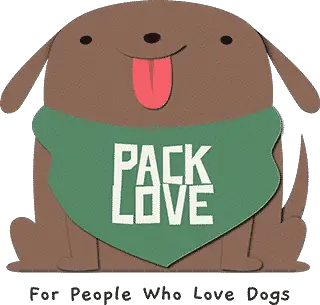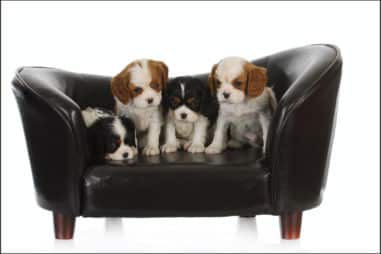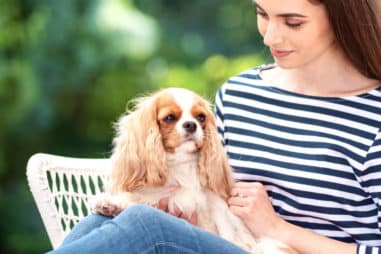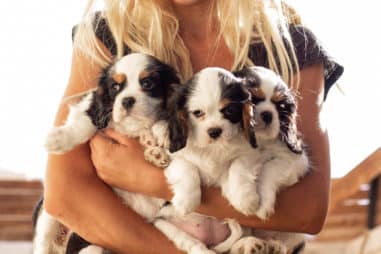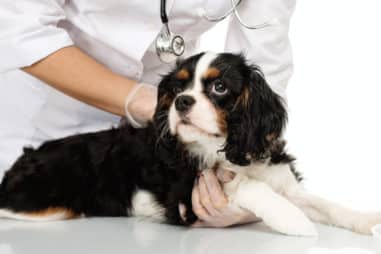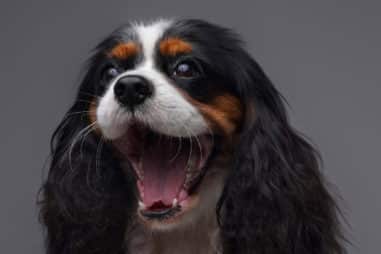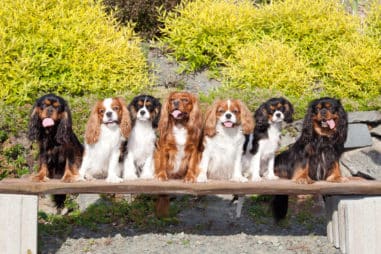Eating a well-balanced meal should be part of a dog’s daily routine. But with all the dog food available on the market, this can confuse many dog owners. Your Cavalier’s diet should cater to their breed, age, and activity level.
Other than that, there are restrictions to consider. Sharing that last piece of bacon with them may be an act of love, but it is not the best idea.
If you are here to figure this out, then you are already in the right direction in becoming a responsible owner. In this article, you will know the nitty-gritty details of feeding your Cavalier!
What Do Cavalier King Charles Spaniels Eat?
Cavaliers can eat dry food, wet or canned food, and you can even serve them raw food if you would like. Whichever you choose, they should get the appropriate amount of the following:
- Protein
- Fat
- Carbohydrates
- Vitamins
- Minerals
There are pros and cons to all three of these options, though. As your Cavalier’s carer, it is important to know these for their health. Your budget is also something to consider when selecting your Cavalier’s food too.
To help you out, below are the advantages and disadvantages of dry, wet, and raw food.
Dry Food
This is the most popular food option for dogs as you see dry food everywhere. With a variety of options on the market, you can even find dry food catered for your Cavalier.
Pros
- Accessible and Affordable
- Easy Storage
- Wide Variety
- Better for the Teeth
Cons
- Harder to Chew
- Lower Palatability
- More Carbohydrates
- More Preservatives
Wet Food
This is popular with picky eaters since wet food smells and tastes better. But there are downsides to wet food that put off dog owners.
Pros
- Accessible
- Better Taste and Smell
- More Protein and Fat
- High Water Content
- Soft and Easier to Eat
- Easy to Add in Supplements and Medicine
Cons
- Takes up Storage Space
- Spoils Quickly
- More Expensive
- Messier
- Dental Issues
Raw Food
Regarded as the best by experts, raw food is the most flexible of all three. You know exactly what your Cavalier is eating and have full control over the ingredients. But there are reasons why many dog owners still stick to the first two options.
Pros
- Better Food Quality
- Easier to Track What Dogs Eat
- Many Health Benefits
- Shinier Coats
- Smaller and Firm Stools
- Better for Weight Management
- Easy to Customize
Cons
- Time Consuming
- Risk of Cross-Contamination
- Needs a Large Freezer Space
- Potential for Bacteria or Parasite Exposure
- Expensive
Along with this, you can add fruits and vegetables to their diet or as treats. Watermelon, for example, is a popular summer treat for dogs as it has high water content. Blueberries too, as many dogs enjoy it served chilled or frozen.
Can Cavalier King Charles Spaniels Eat Apples?
Packed with vitamins A and C, apples are a great treat that your Cavalier can eat. It also contains fiber, which aids in digestion to help with bowel movements. If you have a senior Cavalier, apples are great as it contains low fat and protein.
As with everything else, your Cavalier should eat apples in moderation. Otherwise, this can upset their stomach.
Also, you should peel the apple and get rid of the seeds before serving. The seeds contain cyanide which is a toxic substance to dogs.
Can Cavalier King Charles Spaniels Eat Banana?
Bananas are safe for your Cavalier to eat and it has so many nutritional benefits too. It is high in fiber, vitamin B, vitamin C, and potassium. The magnesium in bananas can also help in bone growth and vitamin absorption.
Be careful in feeding your Cavalier too many bananas, though. This can cause hyperglycemia and constipation.
Can Cavalier King Charles Spaniels Drink Milk?
Your Cavalier can drink milk, but only in small amounts. Many dogs are lactose intolerant and this is the most common food intolerance in canines. The common symptoms of this include vomiting, diarrhea, gassiness, and loose stools.
So if your Cavalier has these symptoms, it is best to avoid giving them milk. But even if your Cavalier is lucky enough to not have lactose intolerance, be careful. Milk is high in sugars and fat, which can lead to obesity.
What Is the Best Food for Cavalier King Charles Spaniels?
The best food for your Cavalier is one that meets their complete nutritional needs. The percentage of each should be appropriate for their age and health needs as well. You can do this with raw food, which gives you full control over what goes in your Cavalier’s diet.
Raw food is the best as the main ingredient is protein, which is what dogs need to eat the most. You can mix in a variety of proteins, like chicken and fish, to make the most out of their benefits.
This diet is also low in carbohydrates, an ingredient that dogs find hard to digest. Dry food or kibbles are often high in carbohydrates. This spikes your Cavalier’s sugar levels, which strains their organs and causes inflammation.
The fun part about raw food is that you can add vegetables on the side. Vegetables not only provide added nutrition, but it also provides fiber in their diet.
Also, you can add supplements to their food too to make a more balanced meal. Fish oil is an example, and it contains omega-3 fatty acids. It makes your Cavalier’s lustrous coat shinier and helps with skin allergies.
There are many benefits to raw food, but not everyone can prepare their dog’s meals from scratch. If that is the case for you, you can use commercial dog food for them. But you are missing out on the benefits that raw food has.
With commercial dog food, it is hard to say what goes into their food. Some have vague labels, which do not help you much. With the variety of dog food on the market, you need to do a lot of research on each too.
This may also mean that you need to give your Cavalier more supplements for their nutrition. Oftentimes, commercial food lacks this. So it is best to be safe and add these into their diet.
Before deciding on anything, you should consult your vet about your Cavalier’s diet. They know more about your furry companion’s health, so they can cater diets for their needs. Especially if your Cavalier has existing health issues, or is a senior.
What Can I Not Feed My Cavalier King Charles Spaniel?
Some fruits like avocados are deadly to your Cavalier. Even popular ingredients in human food, like xylitol, are toxic to them. Many other foods are harmful to your Cavalier, which you should avoid at all costs.
Knowing what these are is part of caring for your furry companion. With this, below is a list of off-limit foods for them.
Fruits
Do not feed your Cavalier any of the following fruits:
“Avocadoes, rhubarb, grapes, raisins, pomegranates, lemons, limes, plums, oranges, tomatoes, plums, and cherries.”
Some of these may not be entirely dangerous, like plums. While the flesh of this fruit is safe, the seed is a choking hazard. But it is best to avoid feeding this to your Cavalier completely to be on the safe side.
But others on the list, like avocados, are toxic as a whole. The flesh, stem, seeds, and leaves all contain persin. Even a small amount of this substance can be fatal for your Cavalier.
Vegetables
The most dangerous veggies for your Cavalier are garlic, onion, chives, and leek. If they eat this, their red blood cells rupture, causing severe anemia.
Other fruits which are less risky but still unsafe are the following:
- Ginger
- Kale
- Pepper
- Spinach
- Eggplant
- Raw Potato
- Mushrooms
Human Food
It can be tempting to share the delicious food on your plate with your Cavalier. But this generous act can cause them serious problems. Some ingredients in human food can be toxic, while others are just not good for their health.
With this, avoid feeding your Cavalier foods with the following:
- Cooked Bones: These are brittle can splinter when chewed on. Cooked bones can cause internal damage, obstructions, and broken teeth.
- Fatty Foods: Like humans, excess salty and fatty food are bad for your Cavalier. So think twice before you share your bacon with them!
- Chocolate: Although you enjoy chocolate, this is toxic to your Cavalier.
- Caffeine: Keep coffee, tea, and soda away from your Cavalier. Caffeine contains theobromine, which can damage the central nervous system.
- Cinnamon: While not toxic, cinnamon can make your Cavalier sick. Ingesting this can lead to diarrhea and vomiting, and even liver disease.
- Macadamia Nuts: This is one of the most poisonous foods to your Cavalier. The more serious side effect of eating this is damaging their nervous system.
- Xylitol: This is a sweetener in human food, found in some peanut butter, gum, and more. It is also an ingredient in toothpaste and some human medications.
How Much Should I Feed My Cavalier King Charles Spaniel?
An adult Cavalier who is around 13 to 18 lbs (6 to 8 kg) needs about 2 cups of food each day. You should divide this into two meals so they feel full throughout the day. Also, you can feed them small portions of other food during the day as a treat.
The right amount of food for your Cavalier depends on their weight, age, and activity level. So if you are not sure about their feeding portions, you should consult your vet.
Why Is My Cavalier King Charles Spaniel Always Hungry?
Your Cavalier may be begging for food as a learned behavior. Dogs love food, so they figured out that their puppy dog eyes get them treats. But their increased appetite is alarming, as it can be due to several health issues too.
Some health issues can cause an increase in their appetite, and this can happen suddenly. So before correcting their behavior, you should rule out these medical conditions first:
- Diabetes
- Hyperadrenocorticism (Cushing’s Disease)
- Exocrine Pancreatic Insufficiency
- Malabsorption Issues
- Bacterial Overgrowth
If your Cavalier has any of these, your vet can provide proper treatment and medication. This should normalize their appetite levels in time.
But if your Cavalier is healthy, then they are just begging for food. By giving them food whenever they ask for attention, you may have trained them to do this by accident.
There are many ways to correct this behavior, but the main thing is to ignore them when they beg. This will teach them that their puppy dog eyes will not get them what they want.
What Should I Feed My Cavalier King Charles Spaniel Puppy?
Your Cavalier pup needs food that is appropriate for their age. Although puppy food has the same ingredients as adult food, the percentages vary. Puppies need more protein, carbohydrates, and fat for their growing needs.
Whether you feed your puppy homemade food or commercial food, they need these 4 main ingredients:
- Protein: For their muscle, tissue, and bone development.
- Fat: An energy source for your growing pup. Omega-3 and omega-6 fatty acids are wonderful for their coats.
- Fiber: These aid in their digestion, helping their bowel movements.
- Vitamins: Necessary for their metabolic processes, keeping them healthy.
Experts recommend that their food should have at least a protein content of 22 percent. With this, the first ingredient in their food should always be protein.
Other ingredients to look for are docosahexaenoic acid (DHA) and arachidonic acid (ARA). These are naturally found in your Cavalier’s milk. But you should continue to include this in their diet even after weaning.
Both help in developing your Cavalier puppy’s cognition and vision. So when buying puppy food, look for fish oils, fish, eggs, and meat meals.
How Much to Feed Cavalier King Charles Spaniel Puppy
A puppy’s food portions changes as they age, and your Cavalier is no different. There are feeding guides on the packaging of most dog foods that you can follow. But below is a general guide on what your puppy may need to help you out.
- 4 Weeks of Age: 1 to 1 and a half cup
- 6 Weeks of Age: 2 cups
- 8 Weeks of Age: 3 cups
- 10 Weeks of Age: 4 cups
- 12 Weeks of Age Until Adulthood: 4 to 5 cups
How Often Should I Feed My Cavalier King Charles Spaniel Puppy?
Make sure to spread your Cavalier puppy’s food into 3 to 4 meals each day. Puppies may not stop eating even if they are already full. This can lead to several issues such as nausea, vomiting, and bloating.
This can even lead to a life-threatening condition called gastric dilation-volvulus (GDV). This occurs when the food and gas cause their stomach to enlarge, twisting it. Your Cavalier pup will find this painful, and GDV needs emergency treatment.
